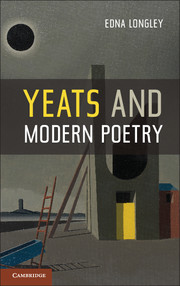Book contents
- Frontmatter
- Dedication
- Contents
- Preface
- Acknowledgements
- List of Abbreviations
- Chapter 1 Ireland as Audience: ‘To write for my own race’
- Chapter 2 Yeats and American Modernism
- Chapter 3 Intricate Trees: The Survival of Symbolism
- Chapter 4 ‘Monstrous familiar images’: Poetry and War, 1914–1923
- Chapter 5 Yeats’s Other Island
- Postscript
- Notes
- Index
Postscript
Published online by Cambridge University Press: 05 June 2014
- Frontmatter
- Dedication
- Contents
- Preface
- Acknowledgements
- List of Abbreviations
- Chapter 1 Ireland as Audience: ‘To write for my own race’
- Chapter 2 Yeats and American Modernism
- Chapter 3 Intricate Trees: The Survival of Symbolism
- Chapter 4 ‘Monstrous familiar images’: Poetry and War, 1914–1923
- Chapter 5 Yeats’s Other Island
- Postscript
- Notes
- Index
Summary
This book has often been concerned with Yeats’s legacy. This Postscript highlights Yeats’s own concern with legacy, the more intense as audience morphed into posterity, and relates it (both concern and legacy) to aesthetic issues in contemporary poetry. If my tone becomes polemical, to talk of ‘legacy’ is to say that a poet’s work is alive. In the refrain of his last poem, ‘The Black Tower’, the dying Yeats promised to go on stirring things up: ‘Old bones upon the mountain shake’ (CW1 339).
‘It is time that I wrote my will ...’
In ‘Meditations in Time of Civil War’, Yeats blurs the line between his Horatian ‘monument’ and his ‘bodily heirs’ (see p. 133). Creativity again merges into procreation in the testamentary third poem of ‘The Tower’ (1925), where the three interwoven sequences that began with ‘Nineteen Hundred and Nineteen’ come to a climax within a climax. The ‘fisherman’, ideal Muse-reader of Yeats’s poetry, now becomes the bearer of its vitality and fertility, its aesthetic genes:
It is time that I wrote my will;
I choose upstanding men
That climb the streams until
The fountain leap, and at dawn
Drop their cast at the side
Of dripping stone; I declare
They shall inherit my pride,
The pride of people that were
Bound neither to Cause nor to State ...
The people of Burke and of Grattan
That gave, though free to refuse –
Pride, like that of the morn,
When the headlong light is loose,
Or that of the fabulous horn,
Or that of the sudden shower
When all streams are dry ...
(CW1 201–2)
The selfish gene has long been intrinsic to lyric poetry as a bid for immortality, a contest between death and beauty. Moreover, Yeats’s poetic legacy intersects with his vulnerable cultural legacy, grandly glossed as bestowed by those who ‘gave, though free to refuse’. Here Yeats exposes the insecure Irish context of his mid-1920s will making. Taken together, Irish and modern tides could make him fear for poetry itself: ‘that high horse riderless’, to quote ‘Coole and Ballylee, 1931’ (249). If Yeats induced ‘anxiety of influence’ in some poets (see below), various insecurities induced ‘anxiety of succession’ in Yeats.
- Type
- Chapter
- Information
- Yeats and Modern Poetry , pp. 193 - 212Publisher: Cambridge University PressPrint publication year: 2013



